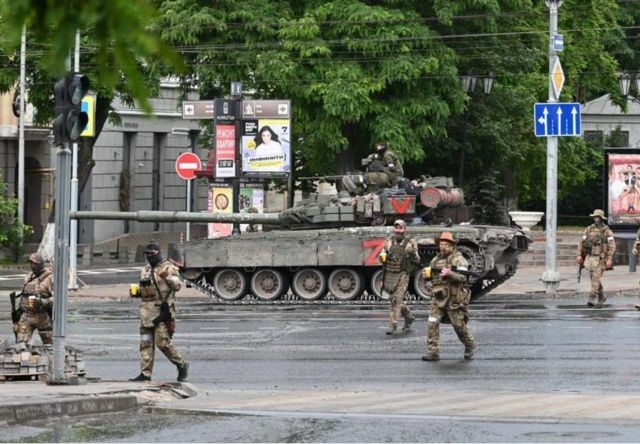Widgetized Section
Go to Admin » Appearance » Widgets » and move Gabfire Widget: Social into that MastheadOverlay zone
The US and its Allies wait to see how the Russian crisis will unfold
Fighters of the Wagner Group load tanks onto trucks on a street in Rostov-on-Don, Russia, before leaving an area at the headquarters of the Southern Military District on June 24, 2023.
The United States and its Allies held close consultations on Saturday but publicly stayed on the sidelines as officials waited to see how the armed rebellion by longtime Kremlin insider Yevgeny Prigozhin and his private army, the Wagner Group, would develop.
When the rebels threatened to march on Moscow and then made a shock withdrawal announcement, U.S. officials were careful not to comment directly on what some highlighted as an internal Russian situation, while Moscow warned them to stay out of the conflict.
U.S. President Joe Biden spoke with the leaders of France, Germany and Britain to discuss developments. At the same time, there are concerns that Russian President Vladimir Putin may be losing control of the nuclear-armed state.
A White House readout of the call said they discussed “the situation with Russia.” On Friday, Mr. Prigozhin announced a challenge to the Russian Defense Ministry, seizing control of the southern city of Rostov-on-Don and sending an armed column toward Moscow. Instead, Mr. Prigozhin announced a U-turn on Saturday, halting the march to Moscow and withdrawing troops back to Ukrainian field camps.
U.S. Defense Secretary Austin also discussed the situation in Russia by phone with his counterparts in Canada, France, Germany, the United Kingdom and Poland, according to a spokesman for Austin.
In a sign of Washington’s grave concern, the chairman of the Joint Chiefs of Staff, General Mark Milley, canceled a planned trip to Israel and Jordan.
U.S. Secretary of State Blinken held a conference call with his counterparts from Western Europe and Japan, and they pledged to “maintain close coordination,” State Department spokesman Matt Miller said after the call.
Eu foreign affairs chief Josep Borrell avoided commenting directly on what he called Russia’s internal problems.
But he said he had activated the EU crisis response centre and was coordinating among EU national officials ahead of an EU foreign Affairs Council meeting on Monday.
“Our support for Ukraine continues unabated,” he added.
A ‘gift’ for Ukraine
Otherwise, officials remain silent, but are clearly watching closely to see how Russia’s worst security crisis in decades will unfold.
Biden and Vice President Harris met earlier Saturday with top U.S. security officials on the Moscow crisis, including Austin, Milley, Director of National Intelligence Michael Haynes and CIA Director William Burns.
A U.S. military source said U.S. officials need to be careful with their words and actions, noting that they do not want to give Putin or others any reason to blame Washington for the current situation.
Moscow issued a stern warning to the United States and its Allies not to intervene.
“The rebellion plays into the hands of Russia’s external enemies,” the foreign ministry said in a statement.
“We warn Western countries against any signs that they may exploit the internal situation in Russia to achieve their Russia-hating goals,” the statement said.
Meanwhile, Moscow’s ally Belarus has called the uprising a gift to the West.
That sentiment was echoed in Kiev, where Deputy Defense Minister Hanna Malyar described the rebellion as a “window of opportunity” for Ukraine’s armed forces.
James Nixey, a Russia expert at the Chatham House think tank in London, said analysts agreed, telling AFP that Ukraine could try to exploit the situation.
Western Allies are also watching to see if the turmoil within Russia gives Ukraine any advantage as it carries out a counteroffensive against invading Russian forces in the east and south of the country.
Experts say a key question is whether Prigozhin’s rebels are trying to gain control of Russia’s nuclear Arsenal, particularly tactical nuclear weapons.
Alexander Vindman, a former White House National Security Council expert on Russia and Eastern Europe, wrote: “This is the emerging danger and one that policymakers fear most: a loose nuke scenario.”
“This fear has haunted U.S. policymakers since the collapse of the Soviet Union,” he said.
The White House did not respond when asked whether Washington had any communication with Moscow about the security of its nuclear weapons.
Mr. Nixey said that while events were still in flux, the West should not see Mr. Prigozhin as a hero or expect Russia’s elites to abandon Mr. Putin for him.
Privately, he said, many Russians may think Putin’s war with Ukraine was a “terrible mistake.”
But Nixey told AFP: “It doesn’t mean supporting Prigozhin because of his maverick personality.”
As for Kiev, he said Prigozhin’s rebellion did not mean the end of their fight.
“While this is a useful distraction for the Ukrainians — they will be glad it happened, and they will seek to exploit it on the front lines — Prigozhin is not their savior.”


